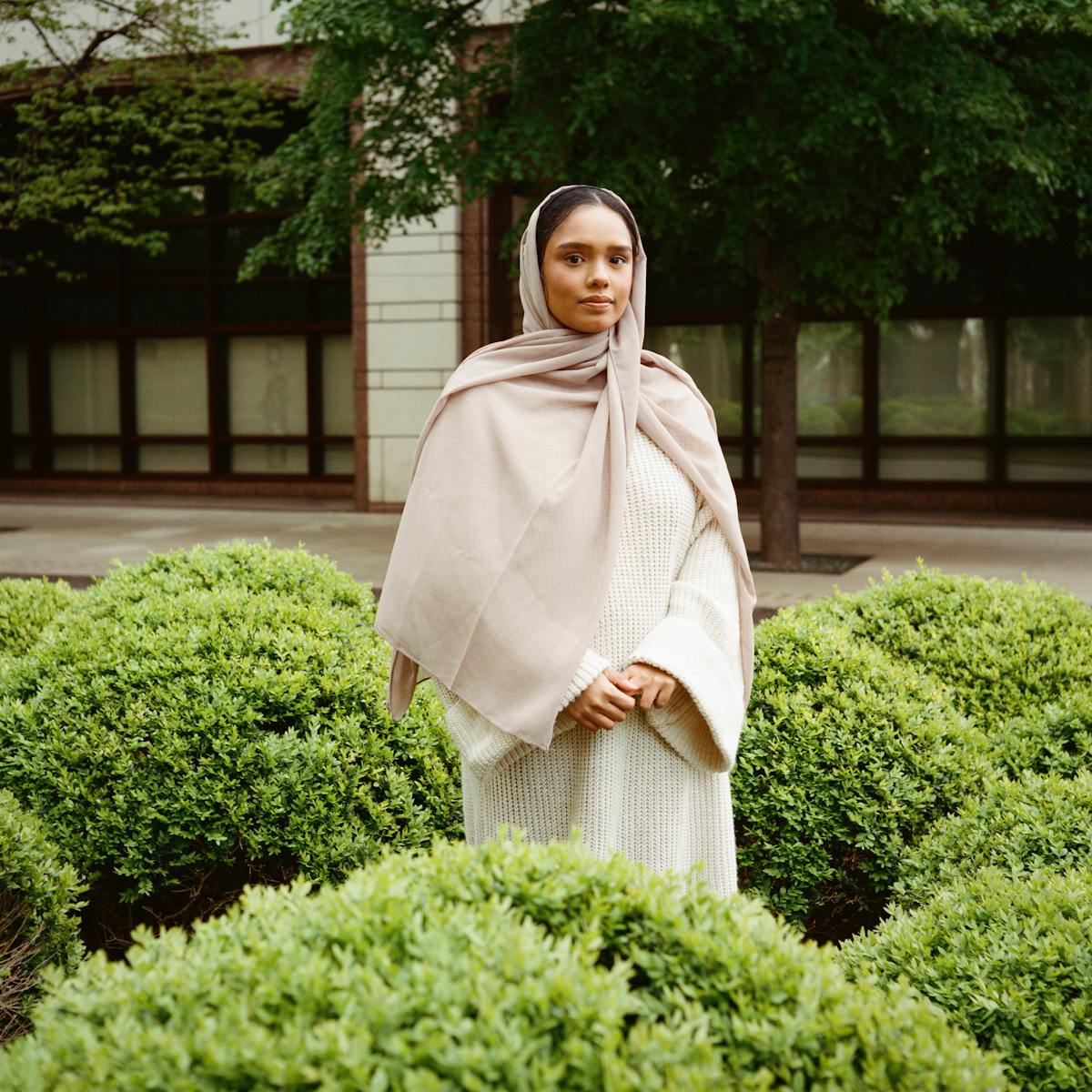Building upon her photo story ‘No you’re not – a portrait of autistic women’, women from minoritised communities talk to photographer Rosie Barnes about their experiences of being autistic in a world fraught with inequalities, misunderstandings and barriers. Their words reveal the complexities which arise when ethnicity and neurodivergence intersect. By breaking through cultural stigmas and biases, these powerful voices advocate for change, paving the way for a society that appreciates and welcomes the full spectrum of human experience.
There has been enormous progress in understanding the experience of autistic women since ‘No you’re not’ was published here two and a half years ago. A surge in the number of women receiving autism and ADHD diagnoses (often both – studies suggest that 50–70 per cent of autistic people also have ADHD), and how they present differently to men, has begun to create an awareness and sense of support previously unseen. Increased press and publicity has allowed more women to feel able to open up publicly about their experiences and diagnoses, which in turn is allowing more autistic women to have the confidence to unmask for the first time and to be their true selves.
However, early research into autism was based on studies of white boys. This fundamental bias has created a weakness in recognising how autism presents in minoritised communities and can mean that autistic individuals, women and girls particularly, are less likely to be identified, face increased stigma and prejudice, and are very often less able to access a diagnosis.
The experiences that these women share shed an important light on the challenges they face. Their voices often describe being autistic against a backdrop of discrimination and shame. But they are creating powerful spaces to confront these taboos, breaking down barriers both within their own communities and society more broadly, and for the benefit of future generations.
In working with these women, I hope that their words will lead to an increased dialogue, where autistic people from all communities can be openly understood, accepted and welcomed as part of a completely normal range of human neurodiversity.
Marsha

Marsha, 35, mother, CEO of charity Black SEN Mamas. Afro-Caribbean heritage.
I went through some horrendous bullying as a child and would try so hard to befriend my bullies, but they would play cruel tricks on me, and I was so confused, as I thought we were getting on so well. I remember thinking, “Why does everyone hate me, no matter what I do? What am I doing wrong?” I tried to tell a teacher, but she just dismissed me. And from that point on I ‘knew’ that I was the problem and believed it was incumbent on me to fix myself and be a better person.
As the mother of three neurodivergent children, it breaks my heart to hear my six-year-old echo the same sentiments, and I have made it my goal in life to ensure they all understand from an early age that they are not and could never be the problem. I never did really learn to be likeable or accepted, and it’s difficult to move away from the psychological schema you have built up around your self-identity, but it’s something I’m working on.
As someone of Afro-Caribbean heritage, I have carried out research into autism and the difference in outcomes depending on background. For the Black neurodivergent community, the intersection of race and neurodivergence has to be considered. Socio-culturally, there is so much ignorance and lack of understanding (within and outside our communities), leading to Black children’s needs not being identified or supported.
In school, the ignorance of teachers (through lack of training) regarding both neurodivergence and race (and the intersectional nuances that accompany those variables) means that a lot of Black children’s needs – communicated behaviourally – are being put down to them being problematic, lazy, aggressive or lacking intelligence. Our children are being failed due to implicit bias. A study carried out in 2021 showed that for every ten white boys with identified special educational needs, only one Black girl will receive an EHCP (Education, Health and Care Plan).
Through my charity, I see that a lot of mothers are now recognising their own neurodivergence through their children. A lot of them had very traumatic childhoods because of zero understanding. They learned to mask heavily, which had devastating implications for their mental health. For Black communities this ignorance persists, and we desperately need change.
I don’t get much sleep at night worrying about the type of world I will one day have to leave my children in. We need a deeper understanding of how to support the most vulnerable members of our society. We need more empathy and humanity, which are being lost so fast, and we should all be worried. I dread the day that I am not here to protect them from such an awful world. I would like to say something more positive, but unfortunately that is just not my reality.
Hazel

Hazel, 45, mother, multilingual autism specialist, founder of Chinese autism support group and non-profit organisation Chinese Autism Community Interest Company (CACIC). Chinese heritage.
Obedience is highly valued in the Chinese culture I was raised in, and while I respected and honoured the elderly or people in authority while growing up, I didn’t always fit the mould of the “good child”; always challenging and questioning things if I didn’t feel they were done correctly or I didn’t understand.
I knew my son was different, but when autism was spoken about as a possibility, nobody in my community or my family wanted to have meaningful conversation about it. It was closed down, a taboo. I looked for other Chinese families but couldn’t find anyone. I mean zero. And I thought, “That’s just not possible.”
The word ‘autism’ is translated into our language as “self-closed disease”. So straight away there is a barrier. It is already stuck in Chinese people’s minds that autism is a disease, it is contagious, it is rare, and it is bad. When I researched more, I realised the cultural stigma has caused so much damage to individuals and their families, making so many hide away for their whole lives.
Up to this point I had obtained a master’s in Autism Studies, I’d worked as a specialist, I’d compiled a Chinese/English information booklet, I’d delivered autism training and workshops, but I was focused on advocating for my son, for other members of my family. I essentially forgot about myself, but the pandemic gave me the time to consider and explore what had always been there.
I am autistic and ADHD. Discovering that I am neurodivergent has been an incredibly transformative experience for me and has given me a profound sense of validation. And it has allowed me to embrace my challenges but also my unique strengths of assertiveness, attention to detail, the ability to hyperfocus, and simply that being autistic has granted me a unique perspective on the world. But it has also created a positive ripple effect on those around me.
The Chinese autism support group I established, CACIC, now helps 70 families from diverse backgrounds, and has reached more than 10,000 people. These families not only have limited understanding of neurodivergence, but also face cultural stigma and language barriers. My goal is to challenge stereotypes, particularly around autism in women and girls, promote acceptance, and contribute to the creation of a more inclusive society where autistic individuals can thrive and be valued for their authentic selves.
I am breaking down the barriers in Chinese culture about autism and getting people to talk more openly and positively, but there is still so much work to be done.
Tasmiyah
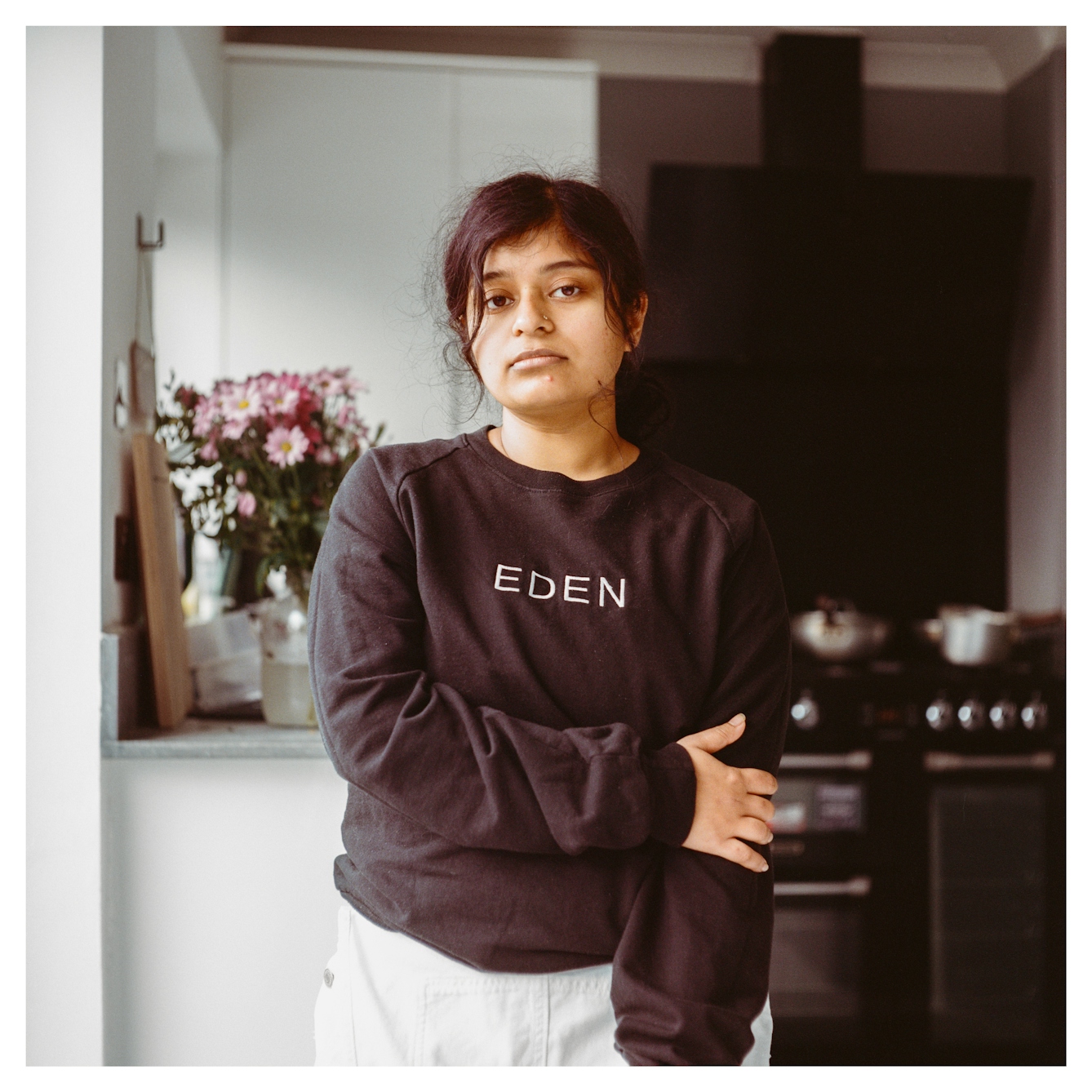
Tasmiyah, 21, freelance actor, writer, filmmaker. Bangladeshi/Bengali heritage.
There’s a feeling in my community that autism is reserved for a specific type of person and that person is not me. Not in our culture, not with our skin colour. And being female, I’m considered a very rare species. I don’t know anyone like me.
I was diagnosed with anxiety and depression at seven, Tourette’s at 15 and autism at 16.
I’ve always done things that aren’t conventional: the kind of music I like, the way I dress. These things have separated me from my community as it is, but with these diagnoses as well, it does make me different in a way that I don’t feel I belong. I get called a coconut, Brown on the outside, white on the inside, so I can’t help but see myself as ‘other’. Not just as an autistic person but as a Brown person.
Being part of an Asian family, I don’t want to say the stereotypes and stigma around mental health are true, but most of them are. It’s a reputation thing. They won’t admit it, but they’re thinking, “How am I going to tell people when I go to their house that my kid is autistic?” There’s embarrassment and there’s shame. And these things are not openly out there in the press, so it’s hidden away and not spoken about. So it’s harder to see it in yourself and harder still in your community.
They always put things down to my personality, so to find out I’m autistic and also now that I’ve started to unmask, it’s just not acceptable any more, but yet, my brother is seven and he’s autistic and he does all sorts of things, so it’s OK for him but not for me. The gender bias is clear. I’m still told I use Tourette’s and autism as an excuse, rather than a reason. Tourette’s is your brain and your nerves glitching – I have no control over it, but even so I’m told when tic-ing or having an autistic meltdown, “Stop acting – you do this to yourself.” I’m so used to it, so tired of it.
I graduated from the National Youth Theatre last summer. I’m unemployed at the moment, but I’m writing a play and developing a documentary. I have a lot of experience, but there are so many barriers for me, so I’m starting to write because it feels the only way that stories like mine might possibly be told.
I do find it difficult to just say, “I am autistic.” It feels embarrassing, unfortunately. I’ve had some terrible things said to me growing up, by strangers, by family, by peers – pathetic, useless, stupid, weird, retard. I don’t really expect people to be nice to me and I never could give myself any kind of love, but I am trying to heal myself now.
Atifa

Atifa, 25, clinical associate psychologist. Bengali Muslim heritage.
I always knew I didn’t fit in but didn’t know why. I felt extremely isolated and didn’t understand other people or how I could communicate with them. Others seemed to find it so easy.
At university I did a placement year in a children’s neurodevelopmental centre. I didn’t even know what autism was, but I learned so much. One day I was talking to a speech and language therapist who mentioned tiptoeing (walking on toes) as a sign of autism. It was a lightbulb moment. It was something that I did. I realised that I related so much to these children in all sorts of ways, so I pursued a diagnosis and officially found out I was autistic when I was 21.
I’m British Bangladeshi Muslim and honestly, my community, my culture has not been accepting or supporting of my neurodivergence. There is such a lack of understanding, and autism is something that is either ignored or seen as something you will grow out of. I often hide it from my community because of judgement, or people telling me they’ll pray that I get better. But there’s nothing to get better from; autism isn’t a disease, it’s a different neurotype; it’s lifelong and needs understanding and support.
There’s so much stigma and ignorance. Being autistic as a woman from an ethnic minority, and a Muslim, creates so many extra barriers. I get challenged with, “Why don’t you have a support worker with you?” But I am married, I have a career, I pay bills and rent.
I find the rules of socialising truly exhausting. I used to go to social media to look for friends, as it’s a controlled environment where I have time to think of my responses and choose when to reply. I mask a huge amount, but my biggest challenge of all is people from my community not taking my diagnosis seriously or others just viewing it as “high-functioning autism”, so basically dismissing all that I find extremely hard.
At work, in an adult autism service, I know my lived experience is of immense benefit and I ensure that every client feels heard. However, I struggle with communication when it comes to other members of my team. I’m expected to act neurotypical; it’s like my own autism gets forgotten, which is ironic. I wish people could just try to understand, to accept us, be kind to us, as part of their ‘normal’.
I really hope doing this helps autistic women from my community to see themselves. I’ve never seen an autistic woman who looks like me, wearing the hijab. I wish I had – it would have helped me so much.
Valerie
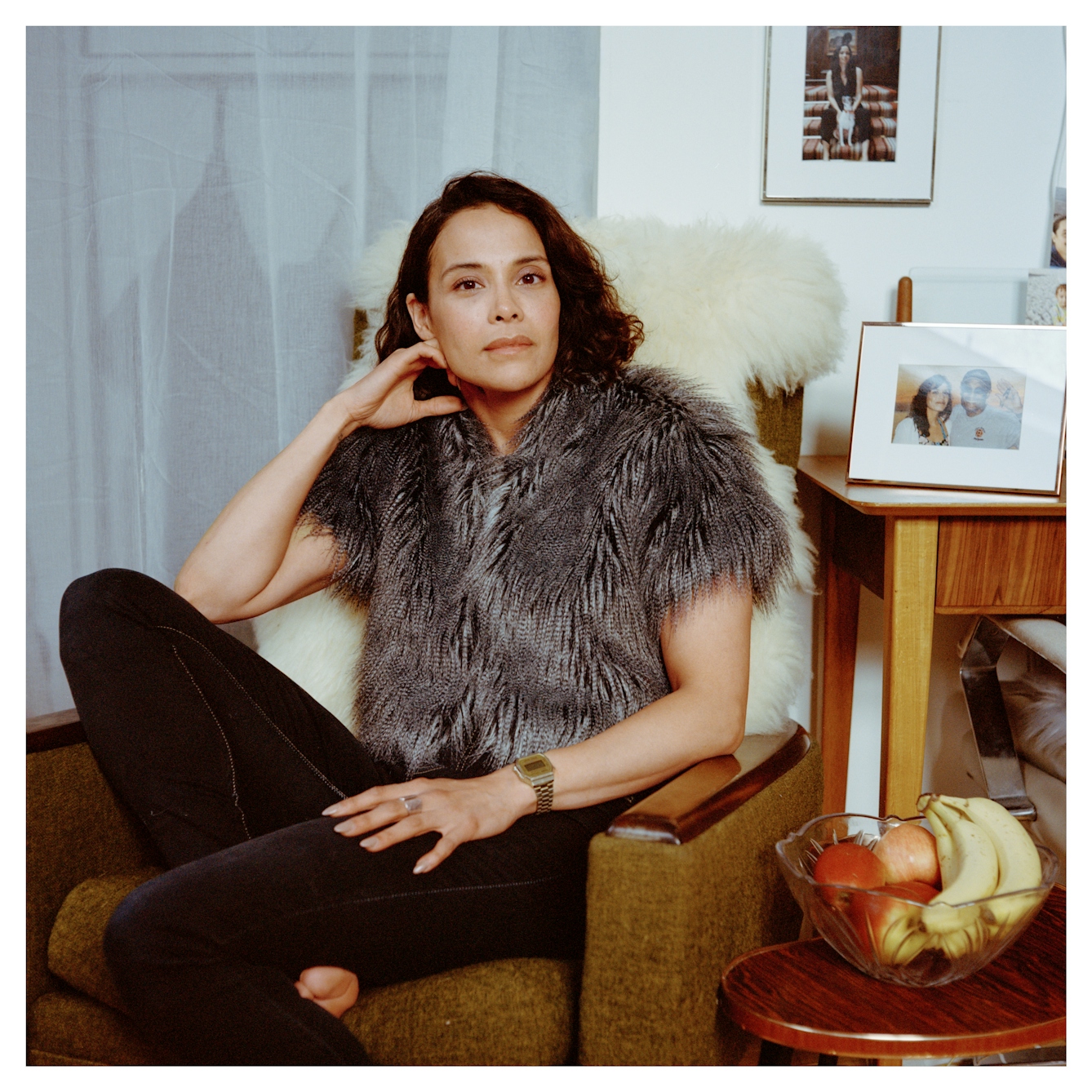
Valerie, 43, dog-walking business owner. Black, White, East Asian heritage.
In a world designed for the benefit of straight, white, neurotypical men, being part of any minority group is often a roadblock to having your voice heard and your needs accommodated. Be it race, culture, religion, gender, sexual orientation, disability or neurotype, if you happen to belong to more than one minority group, the challenges are compounded. I can’t comment on whether life is harder for me than for anyone else who doesn’t tick all of society’s boxes. I just know that it shouldn’t be this hard for anyone.
Growing up mixed race, I assumed that this was the reason for my struggle to find a sense of belonging. I felt not enough of anything and a little too much of everything to be truly accepted anywhere. I felt I had been born with some fundamental humanness missing. How did others know when to talk, when to listen, to think of stuff to say when their heads were so noisy with thoughts, like mine?
I was diagnosed at 42 (autism and inattentive ADHD) and felt relief, validation, grief, shame, uncertainty, loneliness, healing. I had hoped the diagnosis would help those I love and care about to understand me better and misinterpret my behaviour less. In reality, it hasn’t changed much, but how I treat and accept myself and advocate for my own needs is very different.
Before I was self-employed, I would change jobs frequently as I was quickly overwhelmed with the demands of a busy office and unspoken social networking requirements of career progression. I would spend evenings and weekends at home with curtains closed, headphones on, to decompress and recover just enough to start again. I was burned out, depressed and felt inherently broken.
I’m very good at job interviews and meeting new people. I can be engaged and make eye contact and I can seem interesting and interested, like I’m not struggling at all, but very quickly my capacity falls apart. At the moment I have two to three hours where I can engage and listen and respond and seem like I’m “having a nice time”. I am having a nice time but I’m also internally thinking, “I need to retreat to where I can control my physical environment, the sensory and information input.”
It's like most people are running on Apple software but autistics are running on android. There’s nothing wrong with our software, it’s just incompatible with the world’s preferred operating system. In order to function, we have to run every piece of input and output through a complex series of filters.
Autistic women, particularly, are so good at creating these filters that the Apple software can hardly tell that we’re not really Apple too. Our filters get the job done but the additional processing requirements drain our battery very quickly and are prone to bugs and viruses. Eventually, if we don’t find a better fix, we malfunction completely and cease to be able to operate at all.
Savannah
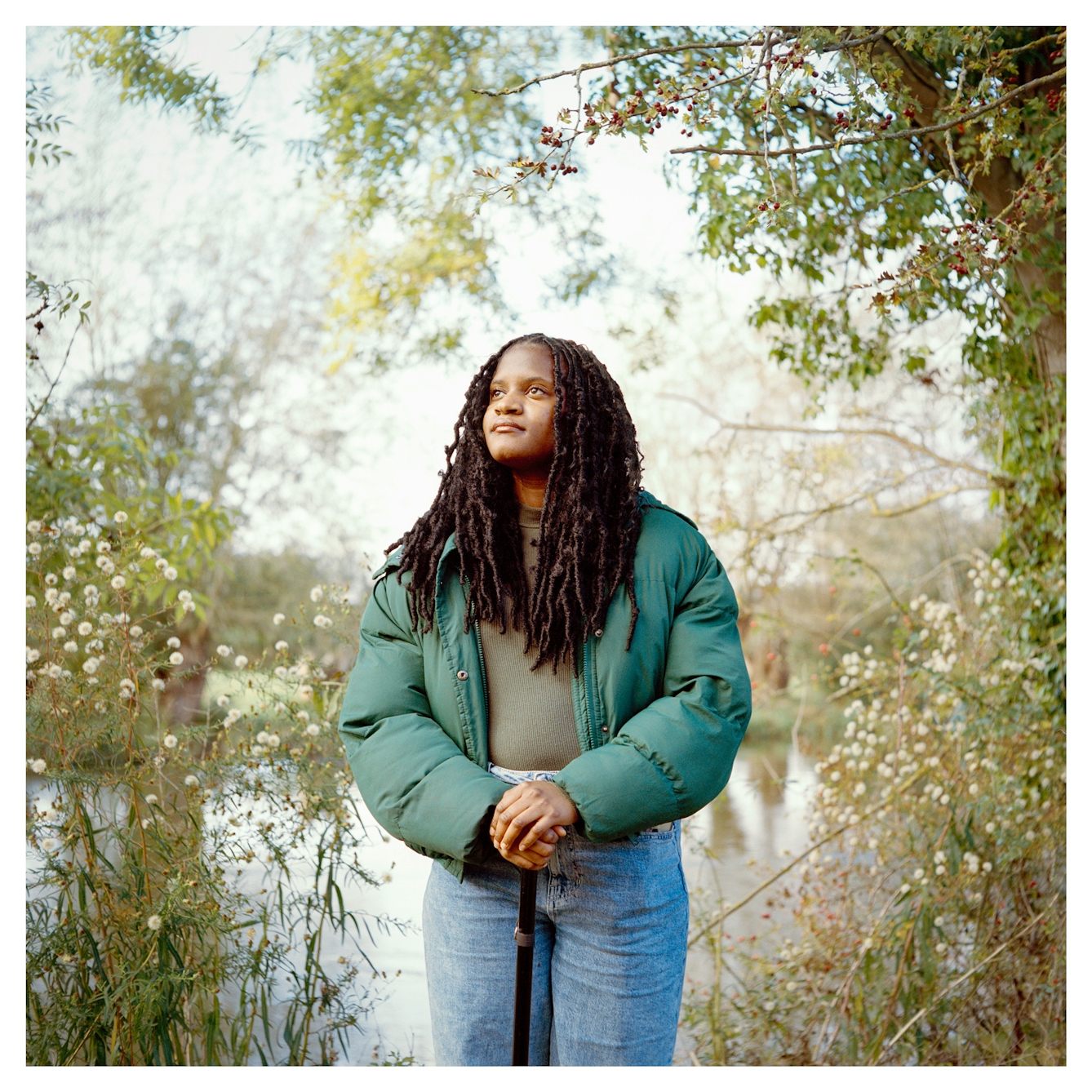
Savannah, 21, undergraduate, Oxford University, Campaign for the Arts trustee, activist, autistic and ADHD. Black British Caribbean (Grenada/Jamaica) heritage.
I had a lot of grief when I found out I was autistic, realising that I’d lost lots of possible friendships because people thought I was rude or that I didn’t care. I didn’t know what they meant. I was just not understanding social niceties.
But it feels, as a Black autistic woman, that I’m not afforded the benefit of the doubt, that maybe I’m not intending to be insulting or rude. I’m just not afforded the grace that lots of white autistic people get, that they’re inherently good and maybe they “didn’t really mean it that way”. People may not be doing it consciously, but they absolutely do do it. It creates this weird environment where you almost have to defend the fact that you’re a good person, a nice person.
I got it a lot growing up. I have a very specific memory of a teacher, Mr Allen. I was being bullied by basically everyone in our class. Instead of pulling those kids up to talk to them, he pulled me into his classroom and said, “You seem to have a problem with all the girls in the class. What's the matter?” As a child, it makes you feel hopeless and there comes a point where you think maybe you are the problem, that you are defective. Black children in general are not deemed worthy of vulnerability, so Black autistic kids, Black ADHD kids, Black mentally ill kids do not stand a chance.
It’s why so many Black women don’t talk about their problems, and they’re then seen as “strong Black women”. But we didn’t just become “strong Black women”, it’s how we were treated as children. It’s insidious. We know we don’t matter as much to wider society.
There’s an automatic perception of me as someone who is angry and aggressive. I get that a lot. Or intimidating. I get called intimidating all the time. I’m a 5’3” woman with a walking stick. Why is a 6’2” white man calling me intimidating?
When neurotypical people identify something different about you, there’s an inability from them to expand their understanding of the world to include that in a way that is accepting. Even if they know you’re autistic, there’s an unwillingness to abandon their worldview. So rather than thinking, “OK, this is different, I can accept this as ‘normal’,” they think, “This is different, I don’t get it, it’s just rude,” and then you’re bullied, ostracised. But as autistic people, we’re expected to abide by and to cater to neurotypical people and their needs and wants all the time. It’s exhausting. And that’s where masking comes from. And if you’re Black, it’s even worse.
Suzan
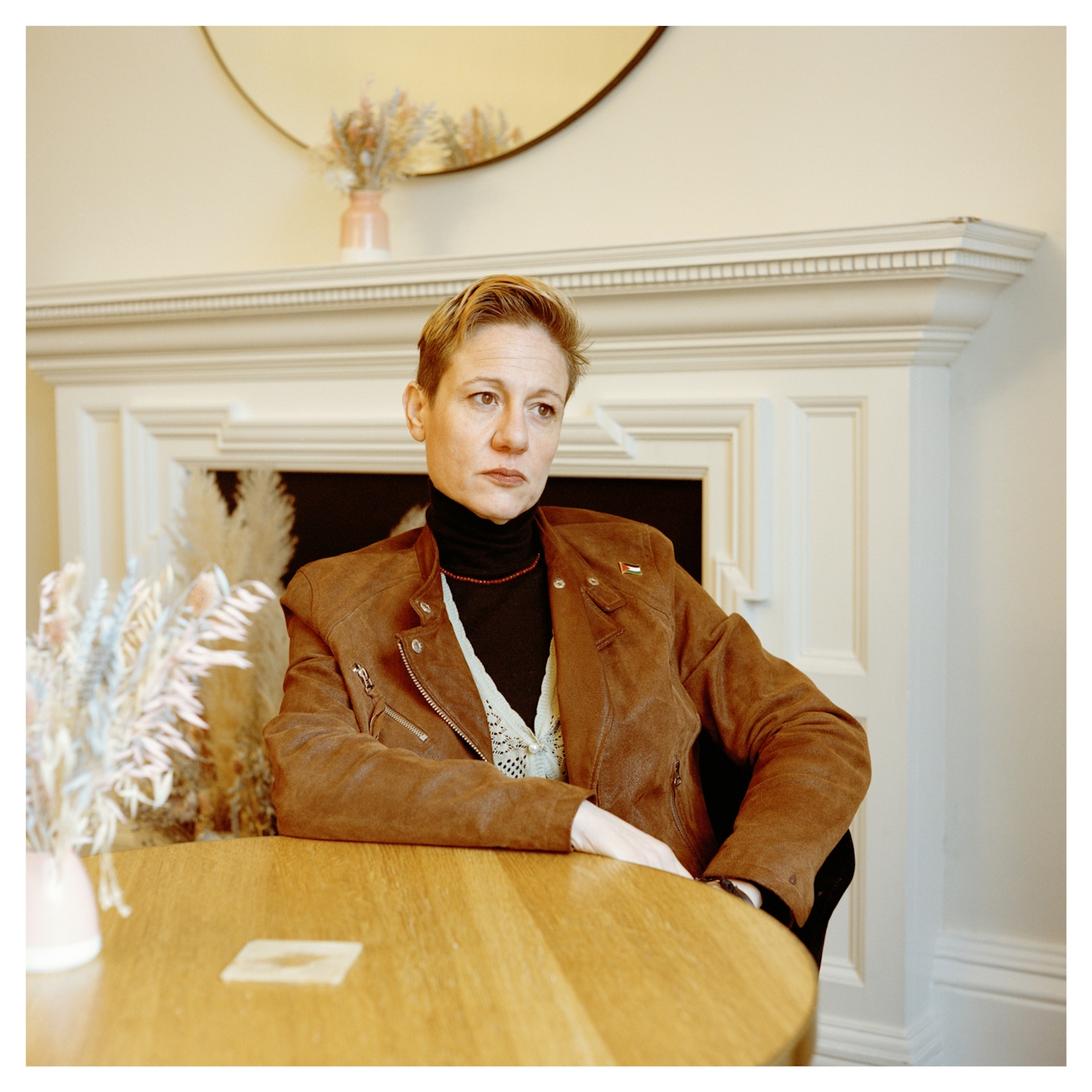
Suzan, 47, mother, Palestine activist, Turkish Cypriot British heritage.
I haven’t “come out” as autistic and ADHD to my community, my parents. It wouldn’t be accepted: it’s not understood and would be dismissed. They’d just say, “No you’re not, there’s nothing wrong with you.”
It’s because I function. I do have support needs, but they have never seen them. They have led lives like a rollercoaster, so they just wouldn’t notice. I always thought my psychological issues/differences were because of my childhood, but then I had a realisation, a revelation, that I was autistic. It changed everything.
In Mediterranean culture everyone is fiery, everybody has a temper – it’s just accepted. We don’t fit into the Northern European box. Some days I need to be really quiet, but you are expected to be hospitable at the drop of a hat. People turn up at your house unannounced and you’re expected to be there, to feed them, to mother them.
As a child I was deemed a tomboy, a troublemaker, an adult. Yes, an adult. I put it down to a traumatic upbringing and felt I didn’t really get the opportunity to be a child. When I was older, I’d always fight in defence of others and had a huge sense of inner justice. I was overly competitive and so frustrated knowing I was intelligent but not getting any support.
I’ve tried so hard to fit in everywhere, but never actually felt I fit anywhere. There are many examples of me being penalised for being myself. In education, in society, in my community, in the work environment, consistently, which is why I burnt out totally. You get the job done, you hit the targets, but your personality isn’t liked. And then just constant pressure to conform the way everyone expects you to.
I was successful in business but was told by my community that was not what I should be doing, I should be at home. It is so hard to show your vulnerability. You present yourself one way, but then they assume you’re fine. It’s impossible.
My physical pain is dismissed by everyone, including medical professionals. I have Ehlers-Danlos syndrome, a connective-tissue disorder which research shows is far more prevalent in autistic women. The more burnt-out you become, the more it will manifest physically. But it’s dismissed.
Some days I can walk ten metres, other days the pain is so bad I can’t get up, so I need a wheelchair, but then they say, “Why do you need a wheelchair? You can walk.” Well, I can’t, because if I do, I would burn out and then I can’t do anything at all. And being autistic, we keep pushing because we want to prove ourselves, we want to just fit in. But by doing that it is to our own detriment. It’s why we’ve got high suicide rates, why we’ve got so many mental health issues. And if you are from a minority group that doesn’t understand, doesn’t support you, it’s even worse.
Monique
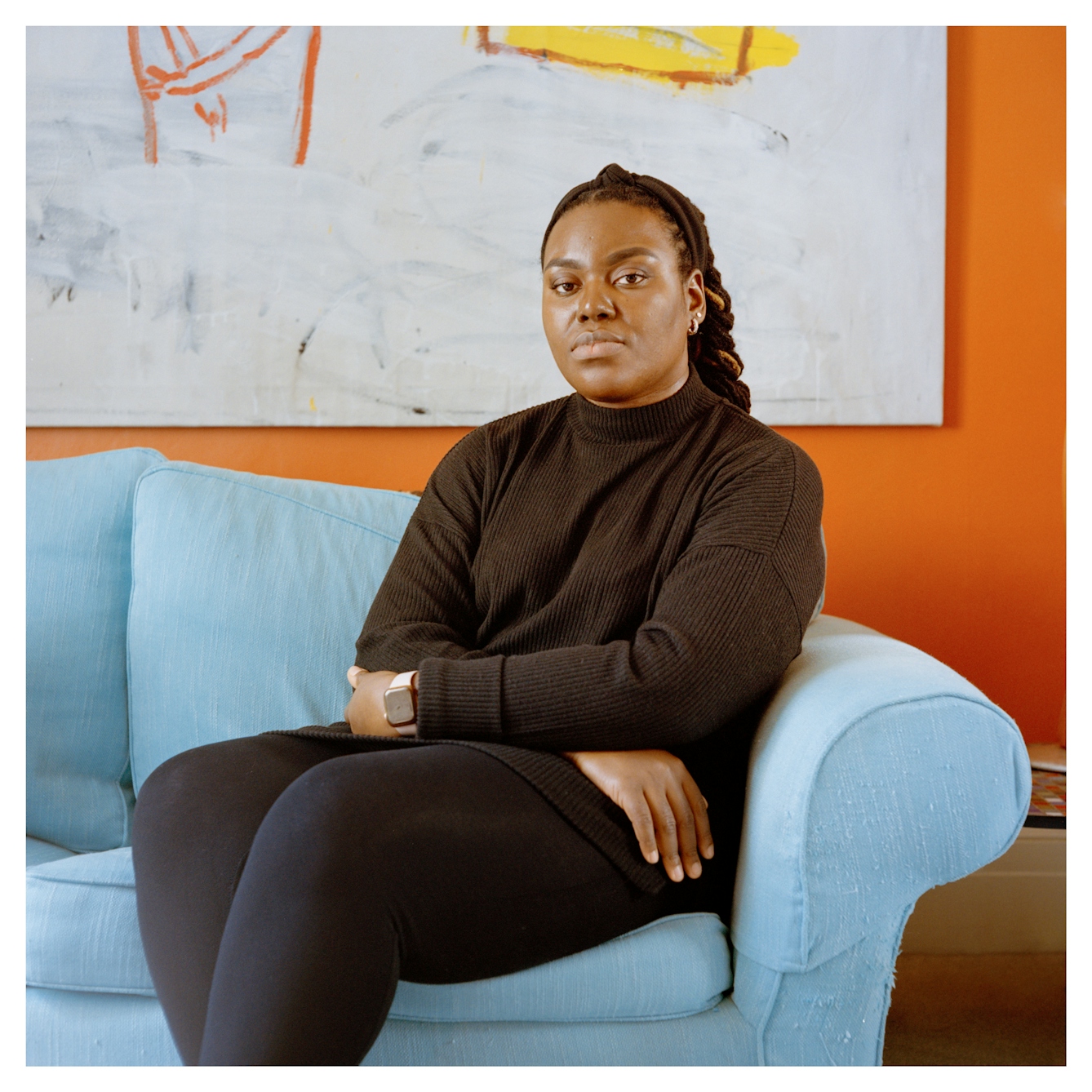
Monique, 31, mother, nursing student. Caribbean heritage.
I definitely mask a lot around family and haven’t told everyone about my diagnosis. It’s just really difficult to talk about anything like this in the Caribbean community. There’s a lot of stigma and a lot is covered up. There’s this whole thing that we’ve got to be strong, we’ve got to put on a front. I wish people would just say how things are. It would make life much less complicated. It’s because of a feeling of having to fit into society because we’re not accepted as much in wider terms. It’s a cultural thing, but it’s also a generational curse that needs breaking. So I’m still finding it hard with my family because I know they’ll say, “Oh no you’re not, you’re fine.”
But I’m not fine. I put on different personas all the time. If I’m with friends I’m thinking, “Oh, I know that she likes this, so I’d better ask her about that, and someone else was going to a wedding and I need to ask her about that,” just trying to keep up with everyone. So I overcompensate, I really do try my best and then I just burn out completely. I’m married but I find it so hard to sustain the relationship that we don’t live together, though we are still married.
I really do struggle with working full time, cooking, housework, doing all the kids’ stuff. By Friday I’m a wreck and then Sunday I’m crying because I’ve got to do the same thing on Monday, so I’m just always struggling, masking, trying to be neurotypical.
I run a meet-up group for autistic women. The difficulties of being autistic and our heritage do come up a lot, but we talk a great deal about how autistic women’s experience differs from men. In some ways sex/gender overrides race, because so many males, Black, Asian, white, get diagnosed very early, but with women, “Oh, they’re managing, they don’t look like they need any support,” but inside we’re falling apart.
I don’t have an issue with saying I’m autistic, but I do have an issue with validating why. I don’t line things up or do things that are more typically male. People ask for a “good example” as to why I’m autistic. I give them one, but they still say, “Well, my friend’s son does this/that,” implying that if I don’t do that too, then I must be lying.
I’m far less judgemental than the neurotypical people I know. I pick up on small details about people and can see their perspectives. I take people as they are. Their age, whether they’re fat, skinny, white, Black, I’m really not bothered, and can’t see how these things matter.
We need to be more open in all areas of our lives. We can’t have situations where we disclose our neurodivergence and people then avoid us because they don’t know what to say, like we’re some sort of alien. Where’s the humanity in that?
Jia-Ai
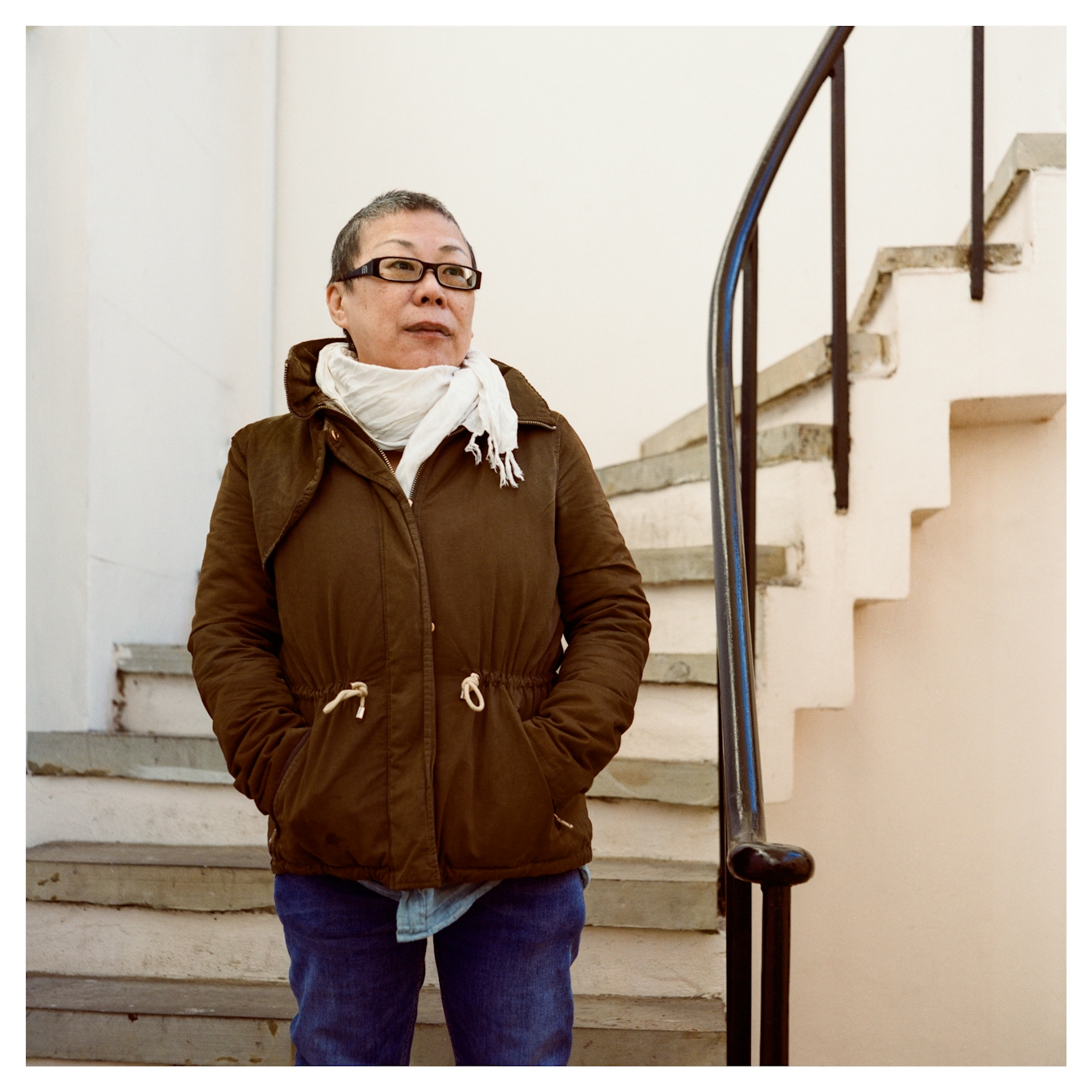
Jia-Ai, 57, counsellor, former writer, journalist. Chinese heritage.
As a child, I was always just in my own world, reading. That’s basically all I did. I watched others, but I never had a feeling at all that I needed friends because the stories gave me a whole world of my own. My parents didn’t notice anything of concern; they didn’t have time and I was like them. I feel lucky for that, because I enjoyed my life, just with my books and stories.
At the end of primary school we were given scores. I was very good at ‘study’ but failed on ‘social’. It was the first time I had some ‘red’ on my report, but I had no understanding of what it meant.
I went from reading to writing. In Chinese culture there’s a lot of emphasis on being hard-working, but the writing didn’t feel like work, nor did school. I did well in exams but never did revision, I just listened and understood. I started writing a crazy amount, I hyperfocused and got lots of things published, so from there I worked as an editor/journalist.
But yes, I failed on ‘social’. I never could fathom how people actually listened to each other, when my ears hurt so much with their voices echoing back and forth. As I tried to socialise, I was told not to be so forward, but I never did understand why I couldn’t just be honest. And I still don’t.
It’s clear to me that people don’t want to know the truth and would rather live in a bubble, a fantasy. They deceive themselves. I wonder what the point is of being alive if you’re living a lie.
The most important thing is to accept yourself for who you are, whatever culture you’re from. If you don’t do that, you can’t be happy. Before I knew I was autistic, I did feel that a piece of me was missing, incomplete, but I couldn’t figure it out. People laughed at my behaviours and things I said, because I was so literal. They made me feel stupid when I knew I wasn’t stupid, so when I found out I’m autistic, that helped a lot, as it explained everything in a logical way.
I see a lot of autistic clients, many Chinese, and it’s so much more obvious in men. In a Chinese family, girls are expected to multitask, so they’re given the opportunity to be good at it, just because they’ve had so much practice. There is no such expectation on men.
I believe I’m a good enough counsellor because I do know what empathy is and I am good at analysis, so, mostly, I can quickly get a clear picture of what’s going on. I am a friendly person, I’m cheerful, I’m generous, and people like me, I think, because I care and I do know how to listen.
My name means “add love”.
About the photographer
Rosie Barnes
Rosie is an award-winning London-based documentary photographer. She started the project ‘No You’re Not – a portrait of autistic women’ in 2018 and the work now extends to around 35 participants. Rosie’s initial interest in the subject came from autism within her own family, but during the making of the work, she has discovered her own neurodivergence. Rosie is also founder of Satsuma Neighbour, which is a radical vision to revolutionise housing for those with low support needs in a truly inclusive way.
